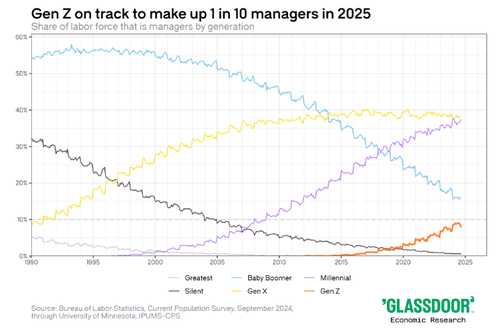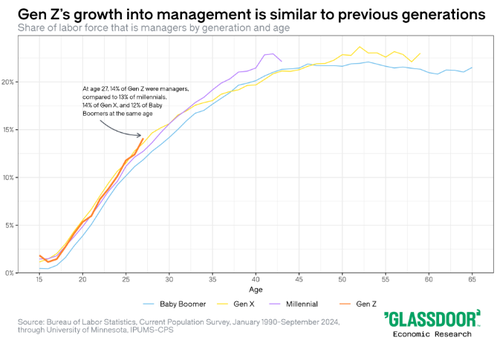Born after 1997, the oldest Gen Zers turned 27 this year and have been in the workforce for about a decade. Despite negative headlines about this generation struggling with disastrous "Bidenomics" and some developing "TikTok brain," a new report shows this generation will secure about 10% of all managerial jobs by 2025.
Glassdoor lead economist Daniel Zhao released the report Tuesday on future work trends titled "Glassdoor Worklife Trends 2025," in which he stated:
The kids are all grown up. In 2025, the oldest members of Gen Z will be 28 with almost a decade in the workforce. Gen Z already makes up just under 20% of the workforce, but as Gen Z ages, they're also quickly entering the ranks of management. Based on current trends, one in ten managers in 2025 will be a member of Gen Z.
Gen Z is on track to follow their older peers into the ranks of management. When comparing against previous generations when they were at the same age, Gen Z behaves very similarly to past generations. For example, 14% of Gen Z workers age 27 are managers, essentially the same percentage as Millennial (13%), Gen X (14%) and Baby Boomer (12%) workers when they were age 27.
Zhao pointed out several changes in leadership styles over the last half-decade, especially since the emergence of Gen Zers securing managerial jobs...
This is a useful reminder that generational differences are often overstated. The youngest members of the workforce often behave differently because of their age not because of their generation (for example, younger workers are likely to switch jobs as they are not settled into their careers, not because of changes in generational attitudes toward loyalty).
That being said, there are some ways that management and leadership styles have shifted over the last five years, and the entry of Gen Z into the management ranks is likely to accompany this different leadership style.
For example, when we look at Glassdoor reviews that discuss leadership or management, a few themes emerge. Terms like wellbeing and empathy are increasingly mentioned, with 222% and 76% increases in mentions, respectively, from 2019 to 2024, as employees look for leaders that are able to empathize with their needs. Similarly, mentions of boundaries (+99%) and burnout (+126%) have surged as workers feel overwhelmed. In turbulent times, employees also expect their leaders to help provide clarity (+52%) and address uncertainty (+45%). Lastly, equity (+41%) and inclusion (+76%) are increasingly important topics, especially for younger workers.
While Gen Zers are coming to age, a separate report earlier this year found that 68% of small business owners say this generation was the "least reliable," while 71% say they're most likely to have a mental health issue in the workplace.
Actual Gen Z bosses.
Is this the longhouse? pic.twitter.com/ZK6FkoF1y3
— Cabana Boy 🌴 (@Alkibiades_) July 10, 2024
Sigh.
Born after 1997, the oldest Gen Zers turned 27 this year and have been in the workforce for about a decade. Despite negative headlines about this generation struggling with disastrous "Bidenomics" and some developing "TikTok brain," a new report shows this generation will secure about 10% of all managerial jobs by 2025.
Glassdoor lead economist Daniel Zhao released the report Tuesday on future work trends titled "Glassdoor Worklife Trends 2025," in which he stated:
The kids are all grown up. In 2025, the oldest members of Gen Z will be 28 with almost a decade in the workforce. Gen Z already makes up just under 20% of the workforce, but as Gen Z ages, they're also quickly entering the ranks of management. Based on current trends, one in ten managers in 2025 will be a member of Gen Z.
Gen Z is on track to follow their older peers into the ranks of management. When comparing against previous generations when they were at the same age, Gen Z behaves very similarly to past generations. For example, 14% of Gen Z workers age 27 are managers, essentially the same percentage as Millennial (13%), Gen X (14%) and Baby Boomer (12%) workers when they were age 27.
Zhao pointed out several changes in leadership styles over the last half-decade, especially since the emergence of Gen Zers securing managerial jobs...
This is a useful reminder that generational differences are often overstated. The youngest members of the workforce often behave differently because of their age not because of their generation (for example, younger workers are likely to switch jobs as they are not settled into their careers, not because of changes in generational attitudes toward loyalty).
That being said, there are some ways that management and leadership styles have shifted over the last five years, and the entry of Gen Z into the management ranks is likely to accompany this different leadership style.
For example, when we look at Glassdoor reviews that discuss leadership or management, a few themes emerge. Terms like wellbeing and empathy are increasingly mentioned, with 222% and 76% increases in mentions, respectively, from 2019 to 2024, as employees look for leaders that are able to empathize with their needs. Similarly, mentions of boundaries (+99%) and burnout (+126%) have surged as workers feel overwhelmed. In turbulent times, employees also expect their leaders to help provide clarity (+52%) and address uncertainty (+45%). Lastly, equity (+41%) and inclusion (+76%) are increasingly important topics, especially for younger workers.
While Gen Zers are coming to age, a separate report earlier this year found that 68% of small business owners say this generation was the "least reliable," while 71% say they're most likely to have a mental health issue in the workplace.
Actual Gen Z bosses.
Is this the longhouse? pic.twitter.com/ZK6FkoF1y3
— Cabana Boy 🌴 (@Alkibiades_) July 10, 2024
Sigh.


